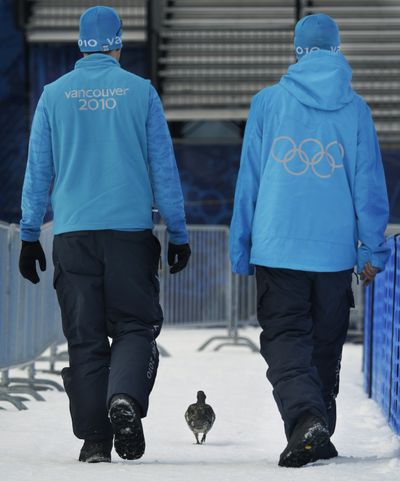Olympics protesters see games’ downside

VANCOUVER, B.C. – While past Olympics have been magnets for protests over issues such as aboriginal rights in Australia and oppression in Tibet, the Vancouver Winter Games are preparing to host one of the biggest displays ever of organized opposition to the Olympics themselves.
Building on years of disgruntlement over the increasingly corporate nature of the games – and widespread alarm over a projected $5.6 billion price tag – a resistance network has vowed to post thousands of protesters outside venues, some of whom aim to disrupt the events.
Security analysts have warned that such domestic protesting is as great a threat to the seamless unfolding of the games as the possibility of a terrorist attack.
Canadian officials, however, have promised to give the demonstrators as much leeway as possible, backing off plans to ban signs, cordon off protesters and use high-tech sonic weapons to disperse unruly crowds.
That open door reflects not only British Columbia’s tradition of tolerance and commitment to free speech, but also an acknowledgment of Vancouver residents’ reservations about hosting the games, the infrastructure for which will probably take years to pay off.
In recent weeks, politicians and small-business owners have been among those raising questions about whether the two-week event, which begins Friday, can possibly be worth the large public expenditures, traffic disruptions and environmental damage.
“Some people are always going to love the Olympics, but most people just want it to go away,” said Chris Shaw, an ophthalmology professor at the University of British Columbia who wrote a book arguing that Vancouver’s bid was an excuse for real estate developers to launch a multibillion-dollar, publicly financed building boom.
“These games are going to bring out a lot of people who are not your traditional protesters,” Shaw said. “You’re going to see a lot of ma-and-pa people out there, standing there talking to tourists and passing out leaflets. That’s a sea change.”
The protests, organizers say, are intended to be nonviolent: noisy rallies, street marches and possibly attempts to block spectators and competitors from reaching the venues.
An array of groups with individual agendas will descend on Vancouver, much as they have during other high-profile events like World Trade Organization and G-20 meetings: North American aboriginal groups that claim the games are being hosted on unceded “stolen land”; conservationists alarmed at the construction of the 62-mile Sea to Sky Highway connecting the city to the skiing venues at Whistler; opponents of tar sands oil development in northern Canada; anti-poverty activists who say the Olympics have further marginalized Vancouver’s poorest residents.
They will join under the umbrella of the Olympic Resistance Network, which has been organizing the effort through its Web site, olympicresistance.net.
“The goal is to … make clear to the world and to other residents in Canada that the Olympics are not all they’re hyped up to be – and to highlight the increasing number of Canadians who believe the games have a lot more negative impact than positive,” said Harsha Walia, a spokeswoman for the network.
The protesters are united, Walia said, by the perception that the Olympics “industry” is benefiting a few while ignoring the needs of citizens who might have been helped by the money being spent to host the games.
According to the Vancouver Organizing Committee, the official operating budget is $1.65 billion, with a total venue construction cost of $542 million.
But that doesn’t include the $825 million cost of expanding the Vancouver convention center, which will serve as the media headquarters; the $748 million spent on the Sea to Sky Highway; and the 11.8-mile, $1.9 billion light rail line from Vancouver International Airport, a portion of which was paid for by a private partner.
Those projects, government officials said, were planned anyway and will be long-term resources for the province.
“Thank goodness that we have such a spectacular facility that will drive economic activity for years into the future,” British Columbia Premier Gordon Campbell said during the convention center’s grand reopening in April.
There have been other estimates, including one recently undertaken by the Vancouver Sun newspaper, that put the total Olympics price tag at closer to $5.6 billion.
According to the resistance network’s Web site, activists plan to kick off their “anti-Olympic convergence” with a series of workshops Wednesday and Thursday, followed by a “take back our city” demonstration on the day of the opening ceremonies. On Saturday, an ominously titled event – “Heart Attack: Street March to Clog the Arteries of Capitalism” – is planned. It promises to “respect diversity of tactics and … disturb ‘business as unusual’ on the first day of the Games!”
In Whistler, anti-Olympics activists are expected to gather near the site of the skiing medals ceremonies to commemorate the thousands of trees and pristine bluffs that were wiped out to make way for the four-lane Sea to Sky Highway, which replaced a narrow, often hazardous road and a large complex of cross-country ski trails.
A bus terminal was built by the province, over the objections of many local officials, to accommodate the vehicles that will be the sole means of access to Whistler during the games. It sits partly on a wooded wetland that is listed as a unique ecological area.